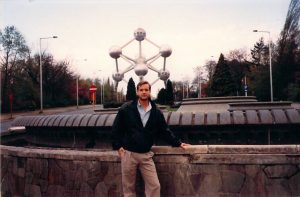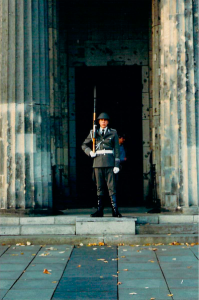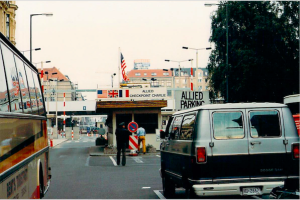- Contact Us Now: (615) 490-6020 Tap Here to Call Us
Memories of a Wall Gone By

I stopped studying the German language in 1987 after making a somewhat embarrassing semantical error. As my college major required a language competency, I chose to switch to the Scandinavian language of my forebears. This decision, in turn, led me to schedule my junior year abroad at the University of Copenhagen, Denmark. As part of that program, I studied Scandinavian government, economics, history and culture. I was also, as a Danish university student, given the opportunity to travel behind the Iron Curtain and visit the countries of Poland, East Germany, USSR (Russia), Latvia, and Lithuania.
I entered Poland in October 1989 from the sea. Denmark and Poland had established a joint ferry service which alternated trips between the countries using Polish and Danish ferries. As our vessel traversed the Baltic Sea, the weather began to worsen and, as the Poles could not afford stabilization systems on their ferries, the ship began to pitch back and forth, at times rather violently. To my surprise, this did not detour the majority of the passengers from entering the duty-free shop below deck where they were tossed about while trying to purchase various consumer goods (cigarettes, liquor, cosmetics, etc).
The hotel that the university program had booked for us was the Grand Hotel Warsaw. If the hotel had truly been “grand” at any point, by 1989 its time had come and passed. In order to raise hard currency, the Polish government had opened a state-run brothel on several floors of the hotel. For those of you who are not familiar with the terms “hard” and “soft” currency, let me just say that in a socialist utopia where everything is theoretically free, money has no meaning (or value) because no one needs or wants it. This situation created astronomical exchange rates between eastern and western currencies, particularly on the black market, and it was easy for anyone to become a “millionaire for a day” if they were willing to exchange a few deutschmarks for an unbelievable quantity of (virtually worthless) zlotys.
On my last day in Poland, a colleague and I were taking a brief walking tour of Warsaw and came upon a young girl, maybe 8-10 years old, staring at a toy store’s front window. At first we thought that the store was out of business, but then realized that the girl was staring at the ONLY toy in the window, a small doll that was possibly homemade and reminiscent of an American toy circa 1910. After studying this sad spectacle for several moments, my colleague finally exclaimed, “I just can’t take this anymore,” and ran into the toy shop. Minutes later, he returned with the doll inside a very plain paper wrapper which he handed to the girl. A look of disbelief, followed by utter joy, crossed her face before she turned and ran off into the distance.
In an additional bid to raise hard currency, the Polish government had also established casinos. Several other students and I decided to visit one of the casinos before we departed Poland. Although somewhat austere and minimalistic by Las Vegas standards, inside the casino we once again had access to Western capitalistic comforts such as liquor, champagne, and tobacco. I approached a blackjack table where a young Polish woman was the dealer. After I had won several times, the young woman was replaced by an older, obviously more experienced dealer. I decided to return to my companions at that point who were enjoying themselves at the casino bar. Later that evening, I saw that the young woman had returned to a blackjack table. I chose to try my luck again and was rewarded with another winning streak. Suddenly, I saw a large burly male, presumably the pit boss, come from the right side of the table. He gave me a challenging look and proclaimed, “You have new dealer now,” as he pushed the young woman aside. I saw a tear form in the corner of her eye as she turned away. It became clear to me that she would be punished, not for her job performance, but because of my luck that evening. I collected my friends and immediately left the establishment (with a considerable amount of the casino’s hard currency in hand).

My first memory of East Germany was, well, that it was grey; really, really, grey (the buildings, the clothes, the weather….). Unlike Poland, East Germany also decidedly had a more “police state” vibe. We were immediately assigned two “watchers;” an older, heavy-set man (who I will call “Carlos”) and a younger woman (“Paulina”) who was a college student at the local university. As our group got on the bus to continue our tour, Carlos asked one of my colleagues, “Is this seat taken?” Whereupon my colleague replied,“It’s a free country.” Carlos’ subsequent double-take in response to the expression “free country” is something I will never forget.
Later that evening, Paulina invited me to go out with her to a nightclub in East Berlin. On the way to the Metro, we passed a group of young East German women singing. Although the accents were heavy, I eventually recognized the song as one from the American hit movie, “Dirty Dancing.” It crossed my mind at the time that the Berlin Wall, if not effective in keeping out Hollywood, would not be standing for much longer. Racing to catch our train, I was slightly ahead of Paulina and attempted to hold its departure by sticking my arm in the still open door. “Stop!!!” Paulina shrieked and I quickly withdrew as the door closed and the train proceeded to leave the station. “Our trains do not have the same safety mechanisms as yours as we cannot afford it,” Paulina explained. “The door would have closed on your arm and you would have been killed.” The nightclub we arrived at was for communist party members only, and a card proving such affiliation was required for entry. For the first time, I saw Eastern Europeans (all party members) openly consuming the same products Polish citizens had struggled to obtain when we crossed the Baltic Sea. John Kenneth Galbraith’s observation appeared to be absolutely true in 1989 East Berlin: “Under capitalism, man exploits man. Under communism, it’s just the opposite.”

By the time I returned to my classroom in Copenhagen in November, the collapse of the Berlin Wall was already underway. In the months that followed, the other remaining communist dictatorships across Eastern Europe would collapse. This caused our Professor of Eastern European Studies a dilemma, as his entire curriculum had been based on a world which no longer existed. When we finally asked in December what to expect on the final exam, our Danish professor replied, “I don’t know because it is all gone. But, I am so happy for all of these people I just don’t care.”
As I look back on my memories from Fall 1989, I cannot help but conclude that physical walls, such as the Berlin Wall, are doomed to fail, because humanity craves contact and communication with each other, and that innate desire will erode a physical structure over time as surely as the elements will eventually reduce the most ambitious constructions to rubble. Of potentially far greater, and more far reaching, harm are the economic walls artificially imposed by governments to divide their people and ultimately restrain their liberties. Our American Constitution has, for over two hundred years, acted as a bulwark against such divisions, and thus the integrity of that document, and all the protections it affords American citizens, must be protected.















